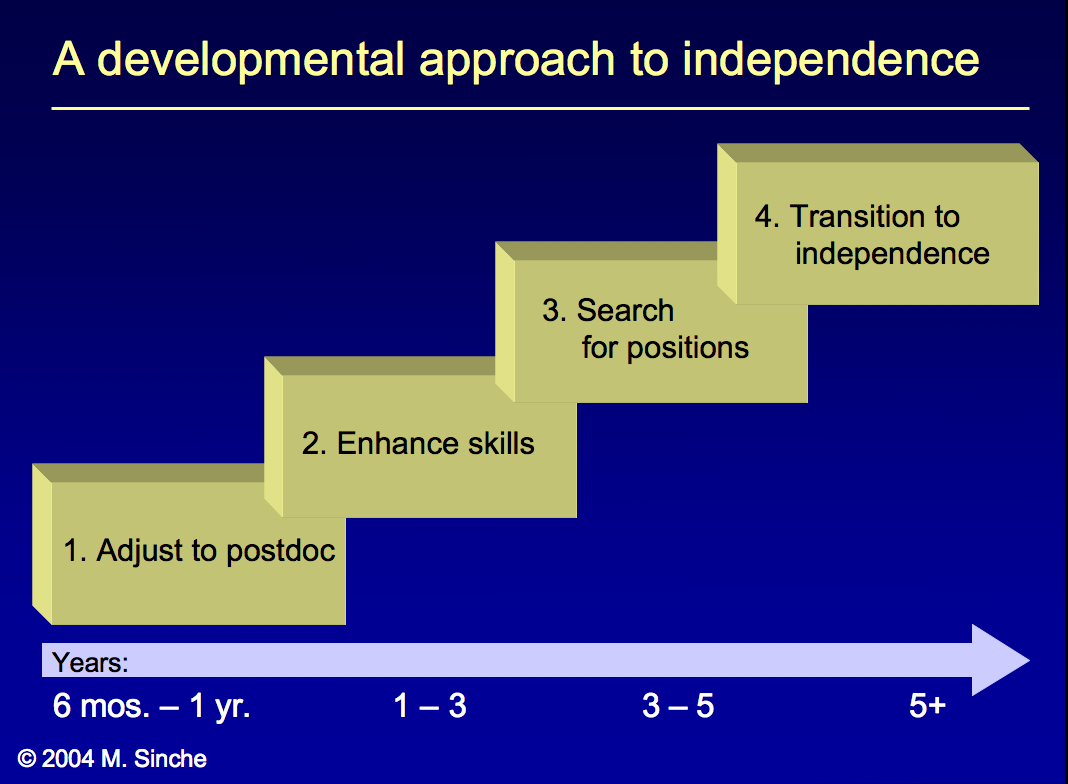A postdoctoral scholar typically moves through the following four stages: (1) adjustment (year 1); (2) skill enhancement (years 2 and 3); (3) search for positions (years 4 and 5); (4) and transition to independence (by year 5). Again, these stages are fluid, and the amount of time actually spent in each stage depends on the individual’s specific skills, discipline, work environment, and mentor.
Stage 1:
During the first stage, postdocs need to develop healthy patterns of behavior that will continue to serve them throughout their tenure. In order to adjust to the training period, postdocs should attend orientation sessions offered through OITE and any offered through their IC. Below are other programs offered to assist postdocs with adjusting effectively:- Working and Living in a Global Community
- Workplace Dynamics I: Gaining Self-Awareness
- Individual counseling appointments (schedule here)
- Speaking Up: How to Ask for What You Need in the Lab and in Life
- U.S. Culture: Informal Discussion
- Improving Spoken English
- Workshop on planning for career satisfaction and success
Stage 2:
During the second stage, postdocs might attend workshops and seminars such as those below to build skills as independent researchers, teachers, and mentors. They might also consider seeking individual grant reviews through PIs or senior staff at OITE.- Workplace Dynamics II: Communication, Learning & Influencing Others
- Workplace Dynamics III: Conflict & Feedback
- Basic Science Writing 4-week course starting in October
- Scientists Teaching Science 2-hr. workshop
- Writing and Publishing a Scientific Paper 4-week course starting in October
Stage 3:
Stage 3 focuses on the development of job search related skills, such as writing effective resumes and CVs, interviewing, negotiating, and so on. OITE offers many programs and services in a variety of formats designed to meet the needs of trainees regardless of the type of career they are pursuing:- Individual career counseling appointments (schedule here)
- Formal assessments to assist in identifying satisfying careers
- NIH alumni database
- Job listings
- LinkedIn NIH Intramural Science group
- CVs and Resumes: Essential Job Search Documents (Sept. workshop)
- An Overview of Careers in Industry for PhD Scientists (Oct. workshop)
- Academic Job Search series (workshops throughout the fall and spring)
- How-To series on prepping for a variety of careers (fall and spring)
- Career Symposium (offered every spring; day-long program includes panels on different occupations in science, skills workshops, and networking opportunities)
- FELCOM career panels and workshops focusing on different careers
Stage 4:
Finally, postdocs in the 4th or transition stage should be preparing to move into their chosen career. OITE offers informative programs for all postdocs in leading teams effectively, resolving conflict, and more:- Workplace Dynamics III: Conflict & Feedback
- Workplace Dynamics IV: Team Skills
- Workplace Dynamics V: Leading Teams
- OITE grant-writing workshops
- FELCOM program on K99 awards (Nov. workshop)





